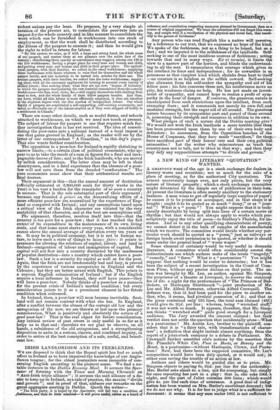IRISH LANDLORDISM AND ITS FEEBLENESS.
Wrs are disposed to think that the Repeal spirit has had so much effect in Ireland as to have impaired the knowledge of our Anglo- Saxon tongue ; for the ablest journalists seem incapable of con- struing English according to the plainest sense. We find a no- table instance in the Dakhla Evening Mail. It accuses the Spec- tator of forming with the Times and Morning Chronicle an "Anti-Irish triple alliance" ; it accuses the said alliance of a de- sire to keep up in Ireland, as a rule of practice, the maxim "divide and govern "; and in proof of that, adduces our remarks on the great aggregate meeting in Dublin. Quoth the writer- " The Insh party, it is hoped by the Spectator, will fall into a condition of feebleness, and thus do little mischief= it will prove useful, rather as a board of reference and consultation respecting measures planned by Government, than as a source of original suggestions: We trust the committee will not forget this warn- ing, and couple with it a recollection of the physical and moral fact, that inacti- vity is the parent of feebleness."
Any person who can read English like a native will perceive, by a reference to our text, that we expressed no hope of the kind. We spoke of the feebleness, not as a thing to be hoped, but as a fact ; and we imputed it to the selfishness of the landlords. Self- seeking is one of the most insidious sources of feebleness ; acting towards that end in many ways. Ex vi termini, it limits the view to a narrow part of the horizon, and blinds the understand- ing to all the rest It emasculates that courage which gives to the intellect its force and independence ; for no cowardice is so poisonous as that simplest kind which shrinks from hurt to itself —no creature is so helpless as the selfish coward. Self-seeking also alienates from the self-seeker the sympathy and aid of his fellow men : his fate concerns them not, his misfortunes move no pity, his weakness claims no help. He has not made an invest- ment of sympathy, and cannot hope to realize a profit of sym- pathy in the hour of danger. E °antlers°, the generous nature is emancipated from such restrictions upon the intellect, from such cramping fears ; and it commands not merely its own full.and unabated strength, but the eager aid of all around. The generous nature becomes by its sympathies part and parcel of those around it, possessing their strength and resources in addition to its own. What pledges of such a nature did the Dublin meeting give ? We would not wish the Irish landlords a more terrible libel than has been pronounced upon them by one of their own body and defenders : he announces, from the Opposition benches of the House of Commons, that they have made "sacrifices," for they-.- have sacrificed part of their horses' oats and their own_politinal, animosities ! Let the writer who misconstrues us teach his countrymen not to talk, not to think in that way; and then they may defy any supposititious attempts "to divide and govern."


























 Previous page
Previous page